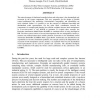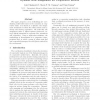50 search results - page 8 / 10 » Coordinated Task Execution for Humanoid Robots |
141
click to vote
DAGSTUHL
1994
15 years 2 months ago
1994
The main advantage of distributed controlled robots and subsystems is the decentralized task execution by the system components. This way, properties for the design of flexible co...
101
click to vote
ICRA
2002
IEEE
15 years 6 months ago
2002
IEEE
This paper proposes a new methodology for coordinating multi-robot teams in the execution of cooperative tasks. It is based on a dynamic role assignment mechanism in which the rob...
139
click to vote
NIPS
2008
15 years 2 months ago
2008
Motor primitives or motion templates have become an important concept for both modeling human motor control as well as generating robot behaviors using imitation learning. Recent ...
IROS
2009
IEEE
15 years 8 months ago
2009
IEEE
— In nature, animal groups achieve robustness and scalability with each individual executes a simple and adaptive strategy. Inspired by this phenomenon, we propose a decentralize...
103
click to vote
ATAL
2006
Springer
15 years 5 months ago
2006
Springer
As agent systems are solving more and more complex tasks in increasingly challenging domains, the systems themselves are becoming more complex too, often compromising their adapti...


